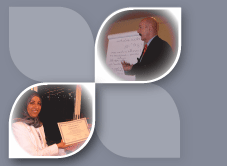|
Postgraduate Course
in Dementia Care No. II
Session 3–- Dementia : Diagnosis, Management
& research
Diagnosing & Management
April 8, 2025
9 am-4 pm Egypt -Hybrid
Meeting Summary for Dementia Workshop
Apr 08, 2025 10:08 AM Beirut ID: 842 6769 6536
Photo gallery
Quick recap
Abdulrazak led a discussion on a workshop
on dementia, emphasizing the need for early diagnosis
and prevention, and the importance of a multidisciplinary
approach to dementia prevention and management. The presentation
covered advances in biomarkers and new imaging techniques
for diagnosing dementia, emerging therapies for Alzheimer's
disease and dementia, and the importance of early diagnosis
of dementia in multi-ethnic communities. The conversation
ended with a discussion on the development of a particular
approach that focuses on learning in a restricted sense,
dependent on some understanding of nonlinear dynamics,
and its potential for early detection of cognitive disorders
and its application in training and rehabilitation.
Next steps
Research Team: Establish a multi-domain
collaborative research team across MENA region to study
dementia genetics and early diagnosis methods
Dr. Abyad's Team: Develop and implement
a protocol for DMD treatment in Kuwait, including setting
up a multidisciplinary team with radiologists, memory
assessment program, ICU, infusion center, genetic testing,
and pharmacy
Research Teams: Work on establishing a
regional database of patients for genetic studies, aiming
for 4,000-5,000 patients to study gene interrelations
with APOE and other genes
Healthcare Professionals: Develop training
programs for healthcare teams on early dementia diagnosis
and assessment techniques
Hospital Teams: Prepare infrastructure
and protocols for implementing Disease Modifying Drugs
treatment, including MRI facilities, biomarker testing,
and specialized care teams
Dr. Abyad & Team: Create awareness
programs about dementia for both healthcare professionals
and the public in the MENA region
University of Reading Team: Continue development
and validation of multi-ethnic diagnostic tools for dementia
assessment
Clinical Teams: Implement comprehensive
assessment protocols including limb apraxia testing for
early dementia diagnosis
Healthcare Facilities: Develop caregiver
support programs and training modules for families of
dementia patients
Policy Makers: Work on developing national
dementia strategies and plans in MENA countries
Professor Samra & Team: Continue data
analysis of the limb apraxia assessment pilot study in
Lebanon and expand testing to larger sample sizes
Professor Douglas & Team: Continue
collecting normative distribution data from older adults
for the binary sequence learning assessment tool
Research Teams: Develop training programs
for clinicians to better recognize atypical dementia syndromes
in the MENA region
Dr. Abyad & Professor Samra: Further
develop collaboration on multi-ethnic diagnostic tools
suitable for the MENA region population
University of Reading Team: Initiate discussions
about development and delivery of training programs to
address capability gaps in diagnosis
Summary
Cairo Workshop on Dementia Diagnosis
Abdulrazak led a discussion about a workshop
on dementia, which is the third of its kind in Cairo.
The workshop is a collaboration with the University of
Reading and will focus on early dementia diagnosis. A
researcher from Reading University will present their
diagnostic studies in the afternoon. The attendees were
welcomed, and Abdulrazak expressed his gratitude for their
attendance and the guest speakers' contributions.
Dementia's Global Burden and Economic
Impact
Abdulrazak presents an overview of the
global burden of dementia, highlighting its rapid increase,
especially in developing countries. He notes that by 2050,
there will be 152 million people with dementia worldwide,
with 70% living in developing countries. The economic
impact is significant, with global costs expected to reach
$2 trillion by 2030. Abdulrazak emphasizes the need for
early diagnosis, caregiver support, integrated care models,
dementia-friendly communities, and development of healthcare
professionals specializing in dementia care. He concludes
that addressing the dementia care gap is a public health
priority that requires urgent attention.
Dementia Diagnosis Challenges in Elderly
Patients
The discussion focuses on the challenges
of diagnosing dementia, particularly in elderly patients.
Abdulrazak explains that dementia is often underdiagnosed,
with up to 75% of cases lacking formal diagnosis, especially
in low-income countries. He emphasizes the importance
of early detection and the need to differentiate between
normal aging, mild cognitive impairment, and dementia.
Abdulrazak also highlights the complexity of dementia
diagnosis due to symptom overlap with other conditions,
atypical presentations, and the limitations of diagnostic
tools. He stresses the need for a comprehensive, multi-modal
approach to diagnosis, including patient history, neuropsychological
testing, neuroimaging, and biomarkers.
Biomarkers and Imaging for Dementia
The presentation discusses advances in
biomarkers and new imaging techniques for diagnosing dementia,
particularly Alzheimer's disease. Dr. Rafminar explains
that there is a shift towards biological diagnosis rather
than clinical diagnosis, with biomarkers potentially detecting
Alzheimer's disease 10-20 years before symptom onset.
Various biomarkers are discussed, including CSF and blood-based
markers, as well as imaging techniques like amyloid PET
scans. The speaker also mentions new research into less
invasive biomarker sources such as saliva, tears, and
nasal swabs, and the potential use of artificial intelligence
in integrating different diagnostic tools.
Multidisciplinary Dementia Prevention
Strategies
The summary discusses the importance of
a multidisciplinary approach to dementia prevention and
management. Professor Ashton presents evidence-based strategies
including nutrition, exercise, and social engagement.
He emphasizes that multi-domain interventions are more
effective than single-domain approaches and highlights
the need for early intervention in high-risk populations.
The presentation also covers the benefits of the Mediterranean
diet, aerobic exercise, and cognitive training. Professor
Ashton recommends integrating dementia prevention strategies
into routine clinical practice and educating patients
about modifiable risk factors.
Alzheimer's Therapies and Diagnostic
Tools
The presentation discusses emerging therapies
for Alzheimer's disease and dementia. Abdulrazak highlights
new diagnostic tools and treatment approaches, including
monoclonal antibodies targeting beta-amyloid and tau proteins.
He mentions recently approved medications like Lecanemab
and Donanemab, noting their potential benefits and challenges
in implementation. The talk also covers other promising
areas such as anti-tau drugs, multi-domain interventions,
and repurposed medications. Abdulrazak emphasizes the
importance of early treatment and prevention, as well
as the need for a multidisciplinary approach in administering
new therapies.
Alzheimer's Research: Early Diagnosis
and Prevention
Professor Khaled from Ibanese University
discusses genetic research on Alzheimer's disease. He
emphasizes the need for early diagnosis and prevention,
noting that the average age of diagnosis in their study
was 79 years old, which is too late for effective treatment.
Khaled argues for a multi-domain approach to research,
combining genetics, environmental factors, and clinical
studies. He highlights the importance of studying multiple
genes beyond just APOE4, as well as considering factors
like iron deficiency and vitamin deficiencies. Khaled
calls for collaboration among researchers to create a
large database of patients and genetic information to
better understand the disease. He also stresses the importance
of keeping elderly people active and engaged in society
as a preventative measure.
Dementia Diagnosis in Multi-Ethnic
Communities
Abdulrazak discussed the importance of
early diagnosis of dementia in multi-ethnic communities.
He highlighted the need for more accurate and sensitive
diagnostic tools, particularly in assessing parietal structures
and cognitive impairments. Abdulrazak presented the work
of his lab, which has been developing a parietal toolbox
of tasks to be incorporated into the assessment of Alzheimer's
disease. He also discussed the challenges of diagnosing
dementia in multi-ethnic communities, particularly the
language barrier and the need for culturally appropriate
assessments. Abdulrazak shared the results of a pilot
study conducted in Lebanon, which showed promising results
for the use of the Dementia Apraxia Test in differentiating
Alzheimer's patients from healthy controls. He emphasized
the need for further research and collaboration to develop
more effective diagnostic tools for dementia in diverse
communities.
Fractal Complexity in Cognitive Disorders
In the meeting, Abdulrazak discussed the
development of a particular approach that focuses on learning
in a restricted sense, dependent on some understanding
of nonlinear dynamics. He highlighted the challenges of
dealing with data from genomic and clinical observations,
which often show complex nonlinear responses. Abdulrazak
proposed using fractal dimensionality as a diagnostic
tool to characterize the progress of morphological changes
in the brain of Alzheimer's patients. He also discussed
the use of binary or minimally distinct stimuli to drive
learning or training tasks, and the importance of fractal
complexity in cognitive tasks. The conversation ended
with a discussion on the potential of using this approach
for early detection of cognitive disorders and its application
in training and rehabilitation.
.....................................................................................................
The International Institute on Ageing-United Nation-Malta
(INIA)
The Advanced Postgraduate Course No. VI
Master Class in Geriatric : Session 6.2 Oct 25-27, 2018
:
Geriatric Giants & Palliative Care in Cairo Egypt
Organised by Egyptian Society of Geriatrics and Gerontology,
Abyad Medical Center, Lebanon and Middle East Longevity
Institute, Lebanon
Photo Gallery
Click
for pdf
National Postgraduate Course in Geriatrics 2016-2017
Monstair, Tunis
web : www.geriatrie-tn.org <http://www.geriatrie-tn.org/>
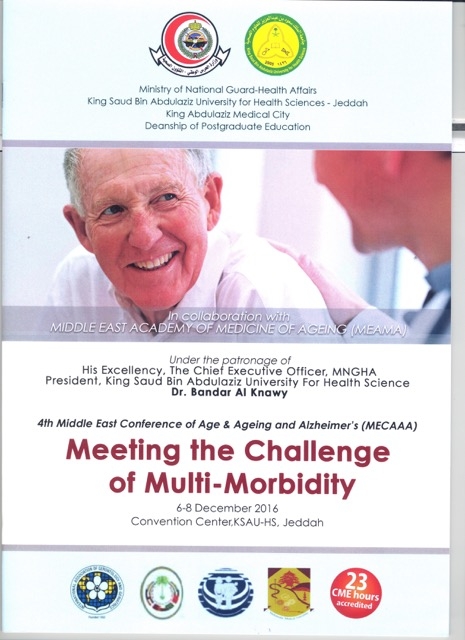
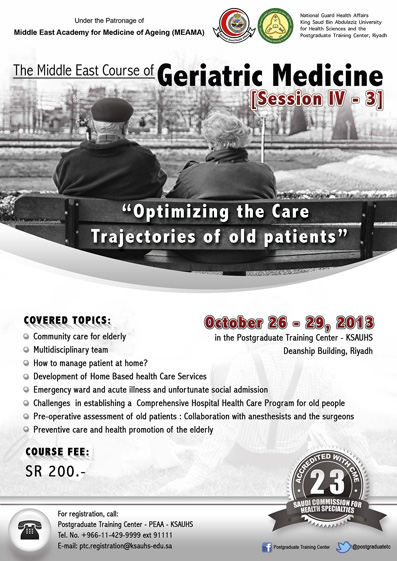
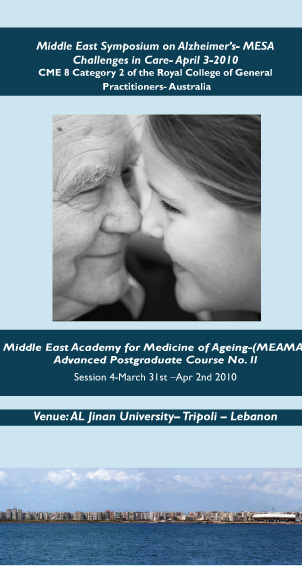

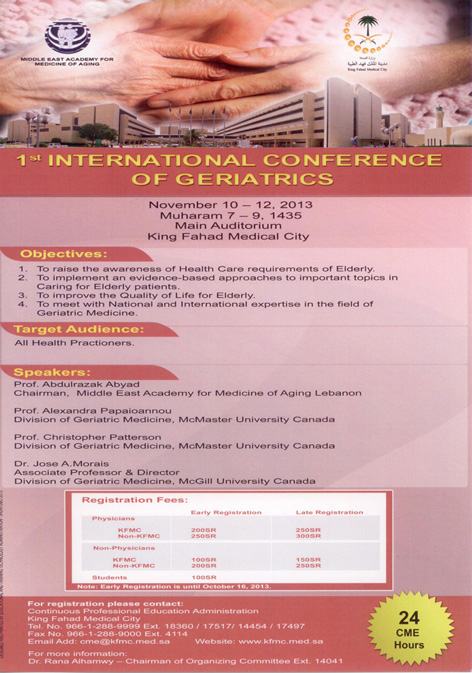
|





